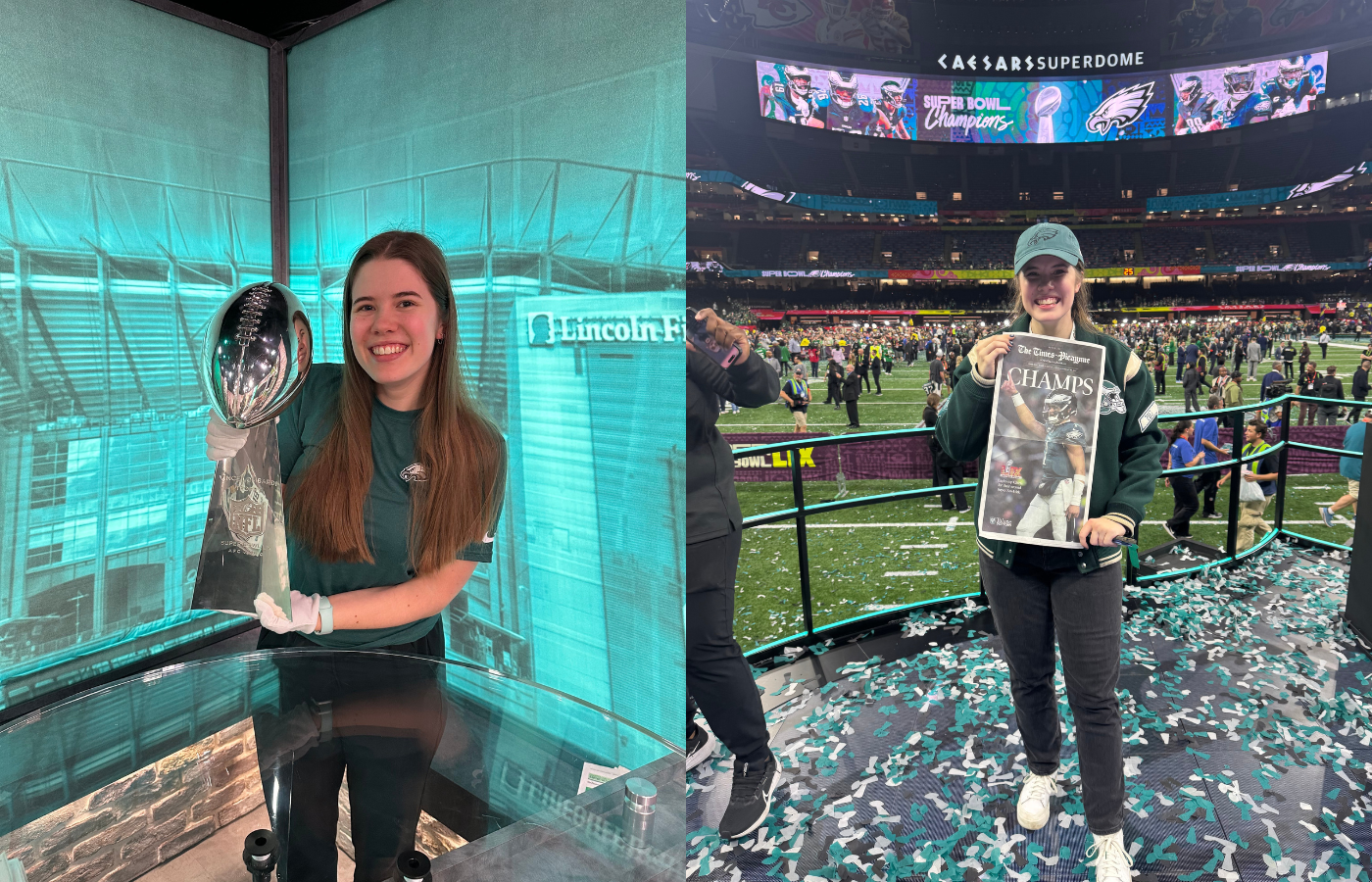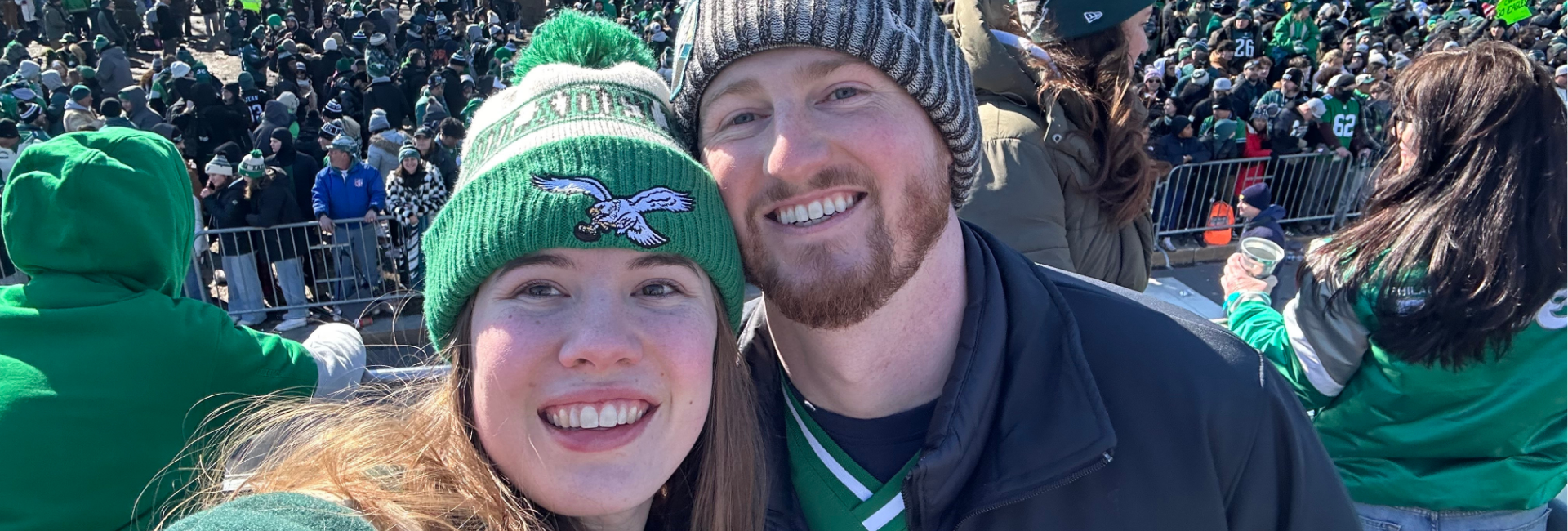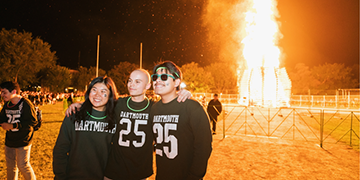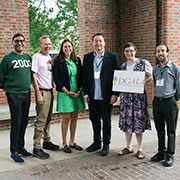A Football Dream Comes True
Data analyst Isabel Pantle has an unforgettable year—and earns a Super Bowl ring.

Jun 30, 2025
5 minute read
James Bressor
5 minute read
Isabel Pantle ’23 beamed as she stood on the field of the Superdome moments after Super Bowl LIX ended this past February. Celebrating with scores of Philadelphia Eagles players, coaches, and staff members in a cloudburst of confetti, the Dartmouth alumna was proud to be a part of the Eagles’ dismantling of the Kansas City Chiefs.
Pantle grew up loving football and math, and since graduating from Dartmouth she has immersed herself in a job that merges those two passions. She is a quantitative analyst for the Eagles, a numbers guru who helps make sense of the nearly infinite data points available to her employer. She and her colleagues make data-driven recommendations to help with decisions made by the team’s coaches and general manager. It’s a highly specialized position found in nearly every National Football League front office.
Pantle says she could not have chosen a better place to work. She loves her job, and to FaceTime her family from the field as the Eagles accepted the Lombardi Trophy made for an unbelievable experience.
“It’s a dream come true to work in the league and be part of a Super Bowl-winning team—and dream is the word,” she says. “I woke up the morning after the Super Bowl and frantically checked my phone. That happened, right? I hadn’t dreamt it?”
Not only was it real, Pantle was sized for her Super Bowl ring in late March, and it should arrive within the next two months. “It will be going into a display on a shelf after I take lots of pictures,” she says.
“Competitive advantage is everything”
Pantle grew up a football fanatic in Baltimore, and attending the Ravens’ 2012 Super Bowl victory parade is one of her most cherished memories. She chose Dartmouth in part because it offered a sports analytics course, co-taught by Michael Herron, the Remson 1943 Professor of Quantitative Social Science and a mentor to Pantle, and Philip J. Hanlon, president emeritus and professor of mathematics.

Herron, who stays in touch with Pantle, remembers her as an enthusiastic student with strong presentation skills.
“In QSS, we emphasize the importance of standing in front of your peers and defending your work,” says Herron. “All QSS majors must complete a thesis or a quarter-long research project. Either way, they must give an oral defense of what they’ve done. We like to think that helps prepare them for their careers. It’s not enough for our graduates to say, ‘Hey, I’m good at writing code.’ AI is going to do that in the future. You must be able to explain what your code does and your overall findings in a way that’s comprehensible and compelling to others.”
Pantle’s QSS research project at Dartmouth examined how different variables in a football game increase the likelihood of holding penalties. Her research grew out of her participation in the Big Data Bowl, an NFL-sponsored contest that invites college students and professionals to contribute to the league’s expanding use of analytics.
“Isabel possesses a great combination of engagement and technical skills, and she’s very conscientious,” Herron says. “If I were running a professional sports team, she is the sort of person I’d want to have around.”
Pantle double majored in mathematics, reflecting her love for quantitative reasoning and logic, and quantitative social science, to improve her technical skills and leverage what she learned in her math courses. She interned with her hometown team, the Ravens, during the summer before her final year at Dartmouth, working in their analytics department. The internship confirmed her desire to pursue a job in the NFL, and she started working for the Eagles in 2023.

Baseball has been a stat-obsessed sport for decades, and football has been catching up over the past 15 years. The NFL today captures each player’s every movement, producing astronomical amounts of data. In the hands of someone like Pantle, these data can be transformed into analytical insights that go far beyond the common statistics football fans have known for years.
“The development of analytics in football definitely accelerated with the emergence of Next Gen Stats, Amazon’s data tracking system,” Pantle says. “Players wear chips in their pads that collect position and movement data at just an enormous rate. The league provides this information to all teams, but teams need to dedicate a lot of resources to get from billions of data points down to anything that you can really use.”
Coming out of Dartmouth, Pantle didn’t simply land a job with an NFL team. The Eagles are “long considered ahead of the curve in the NFL when it comes to analytics,” according to Sports Illustrated. She praises the team for its dedication to analytics and its commitment to developing new hires.
Pantle’s job in the Eagles’ front office is cyclical, with the six members of her department focusing on player personnel outside of the season. That’s when they’re providing predictive modeling of players entering the NFL through the draft and analysis of veteran players available through free agency.
From August through the playoffs, the emphasis pivots to making sure the Eagles are as prepared as possible for their next opponent.
“During the season, we work a lot with the coaches doing opponent scouting and tendency analysis,” Pantle says. “The average NFL play is just a few seconds, and so much happens. Competitive advantage is everything, so we comb through massive amounts of data searching for anything to help tip the scales.”
All members of Pantle’s department are involved in each element of the team’s on-field play—offense, defense, and special teams. Pantle works closely with the defensive coaching staff in particular, meaning she digs deep into opponents’ offense.
“It’s a full-time job and then some. We keep coach’s hours in season,” she says. “It’s long hours during the week. We work Saturdays and then of course Sundays as well. The season can definitely be intense.”
Connected to what’s happening on the field
“Nothing is more rewarding than watching something related to our work pan out on the field. I remember noticing a specific detail about an opponent a few weeks before we played them,” she recalls. “The next day, I pulled some data to study this tendency and ended up bringing it to our coaching staff as something to keep an eye on. A few days later, I watched our team being totally prepared for it on game day. It was an incredible moment when I felt a real connection to what was happening on the field.”
Since becoming immersed in the world of professional football, Pantle’s experience as a viewer has evolved.
“I still watch games just as a fan, when I can,” she says. “But then I’ll see something and start thinking, ‘Oh, that was an interesting wrinkle that they added to that play to help free up some space. That’s something maybe we want to look into.’ Or, ‘This team has been using a different personnel group in this situation. I wonder what the historical success of that strategy is.’ It’s hard to stop from launching into the full-analytic process.”






